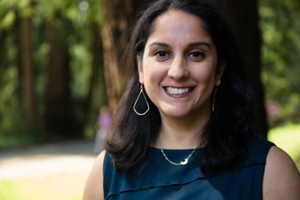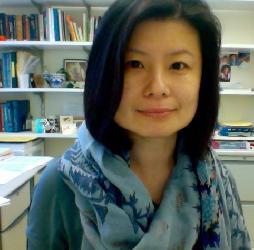Rachel Carson College Faculty Fellows

Sikina Jinnah is Rachel Carson College's new faculty chair!
The Chair of the Faculty is an Academic Senate member, other than the Provost, who is elected by the college Faculty to serve a two year term, and will serve as a member of the Executive Committee.
Dr. Jinnah is an Associate Professor in the Politics Department, an affiliated faculty member in the Environmental Studies Department, and a 2017 Andrew Carnegie Fellow. Her research focuses on the shifting locations of power and influence in global environmental governance, and in particular the role of transnational actors in environmental decision-making. Her most recent projects examine how key norms in global climate politics shape power relations, the role of U.S. preferential trade agreements in shaping environmental policy in trading partner nations, and the politics of climate engineering governance.

- Pronouns she/her
- Title
- Professor
- Division Social Sciences Division
- Department
- Psychology Department
- Phone 831-459-2353
- Website
- Office Location
- Social Sciences 2, Room 257
- Office Hours (Winter 2025) contact via email to schedule an appointment
- Mail Stop Psychology Faculty Services
- Courses Psyc 10: Introduction to Developmental Psychology, Psyc 119E: The World of Babies, Psyc 247: Special Topics in Developmental Psychology, Psyc 290C: Professional Development
- Advisees, Grad Students, Researchers Samantha Basch, Jordi Sterett, Diego Josue Ordonez Rojas
Summary of Expertise
Learning in everyday context; cultural ways of learning; young children's use of technology; parent-child interaction; infant cognition; causal reasoning; spatial learning
Research Interests
Su-hua Wang’s research investigates cognitive development situated in sociocultural contexts, including technology, parent-child interaction, and children’s play.
She studies children’s use of interactive technologies to see how it affects communication and children’s development. For example, in a current project funded by the National Science Foundation (NSF 1617253), she collaborates with researchers in Computer Science and Computational Media to study how interactive technologies facilitate cleft speech therapy; they do so by considering the development of language and communication skills and the role of individual differences.
Her research on parent-child interaction shows that when attempting to teach their babies, parents provide the type of guidance that is supported by their unique cultural values and beliefs. These cultural variations in parental guidance underscore the importance of considering diverse approaches and activities in studying or supporting young children's learning.
She also continues her research program on infant cognition. This work shows that infants under a year of age can learn a new concept through watching just a few examples, and that hands-on experience reduces the amount of examples needed. Furthermore, infants transfer their learning across different modalities, from visual perception to hands-on action, and vice versa.
Biography, Education and Training
Ph.D., University of Illinois at Urbana-Champaign
B.S., M.S., National Taiwan University
Selected Publications
Antrilli, N. K., & Wang, S. (2023). Tangible and digital materials for spatial play: Exploring the effects on parental talk and children's spatial reasoning. British Journal of Educational Technology, 54, 642-661. doi: 10.1111/bjet.13269.
Duh, S., Goldman, E. J., & Wang, S. (2023). The role of intentionality in infants’ prediction of helping and hindering. Journal of Cognition and Development, 24, 105-128. doi: 10.1080/15248372.2022.2124259
Basch, S., Covarrubias, R., & Wang, S.-h. (2022). Minoritized students’ experiences with pandemic-era remote learning inform ways of expanding access. Scholarship of Teaching and Learning in Psychology. Advance online publication. https://doi.org/10.1037/stl0000330
Wang, S., Lang, N., Bunch, G. C., Basch, S., McHugh, S. R., Huitzilopochtli, S., & Callanan, M. (2021). Dismantling persistent deficit narratives about the language and literacy of culturally and linguistically minoritized children and youth: Counter-possibilities. Frontiers in Education, 6, 1-19. doi: 10.3389/feduc.2021.641796
Zhang*, Y., Wang*, S., & Duh, S. (2021). Directive guidance as a cultural practice for learning in Chinese-heritage babies. Human Development. doi: 10.1159/000517081 *These authors contributed equally to this work.
Duh, S., & Wang, S. (2019). Infants detect patterns of choices despite counter evidence, but timing of inconsistency matters. Journal of Cognition and Development, 20, 96-106.
Duval, J., Segura, E., Goldman, E. J., Wang, S., & Kurniawan, S. (2019). Using connected learning design principles to further co-create a critical speech therapy game. Proceedings of the 2019 Connected Learning Summit, 31-38.
Goldman, E. J., & Wang, S. (2019). Comparison facilitates the use of height information by five-month-olds in containment events. Developmental Psychology, 55, 2475–2482.
Wang, S. (2019). Regularity detection and explanation-based learning jointly support learning about physical events in early infancy. Cognitive Psychology, 113, 1-26. PDF
Antrilli, N. K., & Wang, S. (2018). Toddlers on touchscreens: Immediate effects of gaming and physical activity on cognitive flexibility of 2.5-year-olds in the U.S. Journal of Children and Media, 12, 496-513. PDF
Duval, J., Rubin, Z., Goldman, E. J., Antrilli, N. K., Zhang, Y., Wang, S., & Kurniawan, S. (2017). Designing towards maximum motivation and engagement in an interactive speech therapy game. Proceedings of the 2017 Conference on Interaction Design and Children, 589–594. DOI: https://doi.org/10.1145/3078072.3084329
